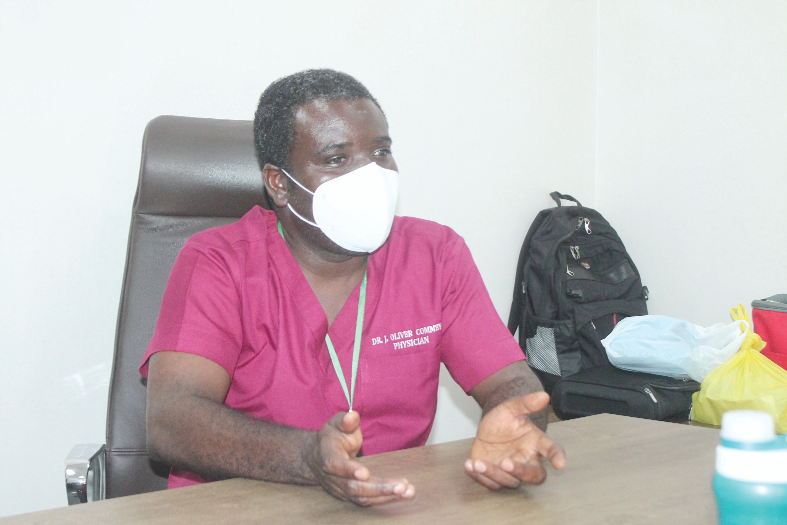
Self-medication adding to risks of COVID-19 morbidity — Dr Oliver-Commey
The acting Director of the Ghana Infectious Diseases Centre (GIDC), Dr Joseph Adjetey Oliver-Commey, has advised the public against self-medication and rather seek early medication to help avert the rise in the rate of fatalities from the COVID-19.
He said self-medication was becoming a major problem in managing the national COVID-19 burden.
Advertisement
Dr Oliver-Commey, who is also a member of the National COVID-19 Management Team, said there was enough evidence to prove that apart from the fact that the mutated strain of the virus was causing severer disease in people exposed to it than the traditional form of the virus, self-medication was a major phenomenon complicating the already bad situation and contributing to an increase in mortality.
Speaking to the Daily Graphic in Accra last Friday, he advised Ghanaians to seek early treatment, instead of waiting until the situation deteriorated before reporting to hospital in order to increase their survival rate.
He explained that the severity of cases caused by the new strain required that people exposed to it report to hospital on time because early intervention was life-saving.
Self medication
The acting Director of the GIDC said with information now widely available, people were resorting to self-medication, which was putting their lives at risk, just as self-medication did in all medical conditions.
“Unfortunately, people who have tested for the virus in private facilities and are positive and people who feel they are exposed to the virus are resorting to either prescriptions on the Internet or prescriptions over the phone from some health professionals.
“These doctors write and sign such prescriptions, screen and send them to their clients through various phone messaging and email platforms.
“Others also sit at home and take all kinds of concoctions, and by the time they feel worse and report to hospital, their situation is near death already.
“Everybody has become an expert, led by the doctors, the nurses, the laboratory scientists. Friends are also sharing their prescriptions. It is contributing to the current problem that we have.
“People are just taking medications without any laboratory follow-up; but, mind you, medicines are not toffees.
“When the situation become quite bad, then they move to hospitals and die there. With regard to what is happening now, yes, there is a mutation, but apart from that, people are self-medicating,” he said.
Cashing in
Dr Oliver-Commey said medications for managing the disease were prescription only drugs, but some health professionals were cashing in on people’s vulnerabilities and fear by prescribing over the phone in exchange for money.
He appealed to health professionals not to see the pandemic as an opportunity to make more money but rather serve man, God and country in a unique way.
He said others were also treating cases at home in isolation, which he said was not helpful because the management of any case required the full complement of the national management system for proper monitoring, even after recovery, to handle any after complications effectively.
Impact
He said because self-medication was worsening the disease burden, both in numbers and severity, most management facilities were getting overwhelmed.
He explained that a facility becoming overwhelmed did not only mean that it was full to capacity; it also meant that due to how severe the cases were, more human resource and management logistics, such as oxygen cylinders, were required.
“For me, numbers in this case don’t tell the story. I have 17 critically and severely ill patients on admission. Some have spent 15 days already and are still on admission.
“I may need only 30 minutes to attend to a mild-to-moderately ill patient, but critically or severely ill patients may require two to three hours each because they are on oxygen almost the whole day and can virtually do nothing for or by themselves.
“This is resulting in a general shortage of oxygen in Greater Accra because almost every in-patient is on oxygen, requiring two to four cylinders a day. We are using the cylinder system and we are using close to 70 cylinders a day for our 17 critically and severely ill patients,” he said.
Symptoms
Dr Oliver-Commey further indicated that the new variant was presenting people who contracted the infection with different symptoms other than the symptoms initially associated with the original virus.
He advised people not to wait to see only the traditional or typical symptoms of COVID-19, such as coughs, fever, difficulty in breathing, loss of smell and taste, among others, before reporting to hospital.
“This is so because in recent times, the disease is presenting with uncommon symptoms, such as red eyes, not being able to sleep, joint aches, fatigue, diarrhoea, sweating at night, back pain and malaria-like feeling.
He said because COVID-19 was caused by a virus, 80 per cent of affected people with strong immunity were most likely to recover naturally, 15 per cent would be moderately ill and would require admissions, one per cent would die and the remaining four per cent would be critically ill.
“But the issue is that you will not know which of these categories you will fall in if you are exposed to the virus, and this is why we must adhere strictly to the safety protocols.
“If you are lucky, you will be among the 80 per cent, but if you are not, you could be part of the critically ill by virtue of having underlying health conditions.
“People with non-communicable diseases and cancers, such as diabetes, hypertension, among others, and those taking medication to suppress their immune system are more at risk of dying from the disease, but we are all at equal risk of contracting the COVID-19,” he said.
The preventive protocols are currently the only way of staying safe.
Writer’s email: [email protected]



